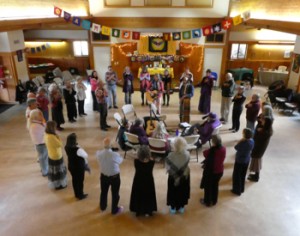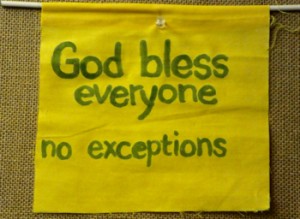Manage Your Energy Part 79: Spiritual Retreat Experiences with My Teacher, Part 1
“This work can’t be taught—it has to be caught!” SAM Lewis
Finding myself having a spiritual Teacher something that happened about a decade after I had given up the search and decided I did not need or want one. The fact that he was indeed my Teacher was unequivocal, and I had both to adjust to the notion and work diligently to bring it about.
In this culture, we look askance upon having a Teacher. As with the rest of life, the spiritual scene includes a lot of misguided people doing strange things together, running the range from mutual but well-meaning confusion to blatant power games and various types of abuse. I find myself wanting to share the simple joys of my own experience.
The spiritual lineage with which I am connected has a very natural way of interacting with our teachers. We  love and honor them, yet we all understand that they are playing the role and figuratively wearing the mantle of Teacher. They are not held out to be better human beings than their students. Teachers are appreciated in that they help to inspire others to sense and express divine energies.
love and honor them, yet we all understand that they are playing the role and figuratively wearing the mantle of Teacher. They are not held out to be better human beings than their students. Teachers are appreciated in that they help to inspire others to sense and express divine energies.
Naturally, I bring a unique type of attention into my relationship with my Teacher. (I’ll call him “W” for ease here.) It is a connection like no other, infinitely personal yet impersonal at the same time. It is about energy and essence instead of personality. W openly receives and reflects real Love, but actively and consistently pushes away any shred of attachment.
W shows amazing internal freedom and mastery. He is humble and self-effaced, and yet fierce—sometimes even startlingly abrupt if one verges into stupidity in his presence. At the same time he is one of the two people I feel the safest around. He reveals me to myself, challenges my limitations, and also subtly protects me when I am truly open and tender. He is usually grounded as a mountain, yet open and sensitive, expressing a vast array of subtle and powerful qualities of energy.
I would like to describe my experience with W over a several hour period at my retreat. The non-accidental element builds and builds:
The group did a partner dance (Dances of Universal Peace, originated by my Teacher’s Teacher) practice during which one person radiates like the sun while the other receives like the moon. Then we reverse roles. Last we go into a balanced Unity between both attributes and persons, before moving to the next partner.
I got to partner with W at one point. During the Unity part of the practice I intentionally sensed into the light at his crown chakra, sought to match mine to it, and placed my stream of light inside of his. (One’s spiritual Teacher, lineage, or the Divine are the only influences one should allow into one’s crown center, since this connection allows for direct influence.)
Smiling together as we turned in dance, we whirled on a pivotal axis of shared light, in a loving and comfortable unity. This was totally magical—a peak experience for me. This was so joyously and unequivocally mutual, feeling and noticing together without the sense of distance between souls—the painful underlying separation—that marks most human contact. It felt Divine. I removed all walls and veils and felt utterly safe and totally “seen.”
Being able to to enter into loving Oneness with all of life is a wonderful spiritual goal—yet it’s challenging to be so open. I honor W’s inner strength, being solidly enough inside himself to melt into a sense of Unity with many different types of people. I still find it hard to experience Unity with those who are not yet open to experiencing it themselves. Feeling it with one person, even for a few moments, helps me to contemplate our human potential to experience Unity consistently and with All. This ‘teaching’ occurred without words, through direct experience.
Have you had anyone in your life with whom you have experienced the joy of a spiritual and intuitive sense of Unity without being in an intimate relationship?
What brings YOU into an experience of Unity?




 whatever was still left of almost every trauma I have endured in the course of my life. I found myself afraid to do my practices after that because I don’t want the consequence of having to drink the poison.”
whatever was still left of almost every trauma I have endured in the course of my life. I found myself afraid to do my practices after that because I don’t want the consequence of having to drink the poison.”


 that your arm and hand are in correct relationship with your body.
that your arm and hand are in correct relationship with your body.
 because they are pursued in the belief that they help towards God-realization.” ~Meher Baba.
because they are pursued in the belief that they help towards God-realization.” ~Meher Baba.
 themselves are not love. Love springs from awareness. It is only inasmuch as you see someone as he or she really is here and how and not as they are in your memory or your desire or in your imagination or projection that you can truly love them, otherwise it is not the person that you love but the idea that you have formed of this person, or this person as the object of your desire not as he or she is in themselves.
themselves are not love. Love springs from awareness. It is only inasmuch as you see someone as he or she really is here and how and not as they are in your memory or your desire or in your imagination or projection that you can truly love them, otherwise it is not the person that you love but the idea that you have formed of this person, or this person as the object of your desire not as he or she is in themselves.
 So you cannot divide believers from mystics around experiences. They both have experiences of their faith but they come to them through different means. Both are valid, even if I do not understand how it works for others who are not like me.”
So you cannot divide believers from mystics around experiences. They both have experiences of their faith but they come to them through different means. Both are valid, even if I do not understand how it works for others who are not like me.”
 belief that is mind-based, garnered from something one has been told to believe, instead of upon direct personal experience.
belief that is mind-based, garnered from something one has been told to believe, instead of upon direct personal experience.

